Welcome to your ultimate resource on Vietnam Citizenship By Investment. This guide aims to provide you with comprehensive insights into how you can obtain a Vietnamese passport through investment. As potential investors embark on their journey, understanding the intricacies of Vietnam residency by investment becomes vital. This guide will discuss various investment options, eligibility criteria, and the naturalization process for those considering making Vietnam their new home.
By exploring the various investment categories available, you will be better equipped to navigate the requirements necessary for securing your Vietnamese citizenship. Important steps in the application process and the advantages of life in Vietnam will also be highlighted. As you delve deeper into this guide, be sure to check out Vietnam’s Investor Visa details for any further assistance123.
Key Takeaways
- Vietnam allows citizenship by investment primarily through residency options.
- Various investor visa categories exist, including DT1 to DT4.
- The investment capital required varies, starting from less than VND 3 billion.
- Foreign investors can apply for visas for their family, including spouses and children.
- Vietnamese passport holders enjoy visa-free access to around 148 countries.
- The approval timeframe for obtaining investor visas generally takes about 5-7 working days.
- Living in Vietnam offers unique benefits, from diverse culture to low-income taxes.
Understanding Vietnam Citizenship and Residency Options
Acquiring Vietnam citizenship is an appealing prospect for many foreign investors. The pathways to obtaining Vietnam citizenship are often linked with Vietnam immigration by investment, which allows foreigners to apply for various types of visas that may lead to permanent residency and eventually citizenship. Although there is no dedicated “citizenship by investment” program, numerous options are available for investors wishing to reside in Vietnam due to its growing economy and vibrant culture.
To be eligible for Vietnam citizenship, applicants must typically be at least 18 years old and have lived in Vietnam for a minimum of five consecutive years4. This requirement aligns with the broader criteria that demand individuals demonstrate financial stability, proficiency in the Vietnamese language, and a clean criminal record45. An increase in expatriates seeking long-term residency options indicates that Vietnam has become an attractive destination for those considering these pathways5.
The economic benefits of moving to Vietnam are significant. Foreign investors can own property and land, which is not typically available to non-citizens4. Furthermore, Vietnamese citizens enjoy full political rights, including the ability to vote in national and local elections4. This growing interest in Vietnam as a residence option highlights the favorable immigration policies that the country has adopted in recent years, making it easier for certain foreigners to obtain permanent residency5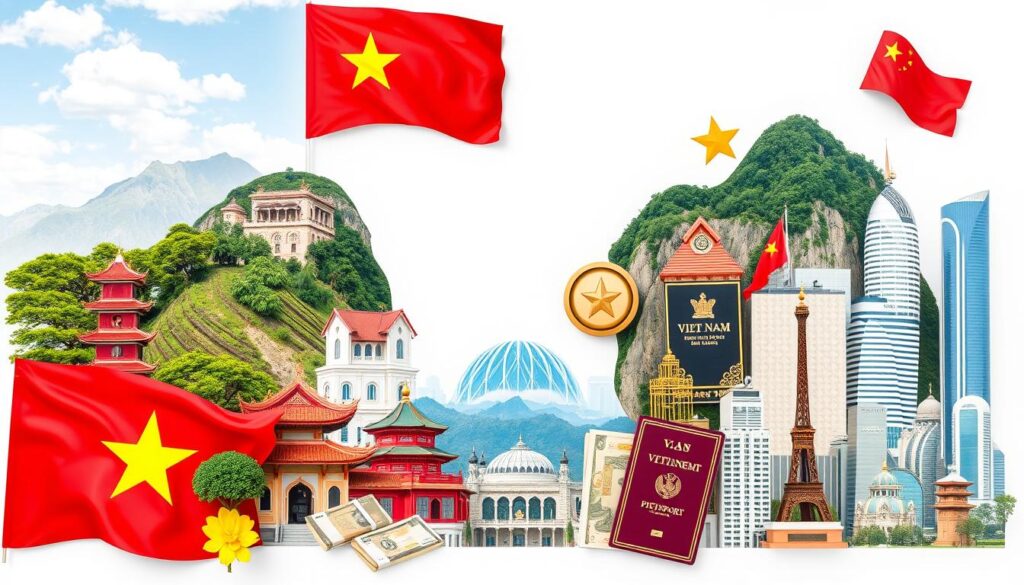
| Eligibility Criteria | Description |
|---|---|
| Age Requirement | Must be at least 18 years old. |
| Residency Period | Must have lived in Vietnam for a minimum of five consecutive years. |
| Language Proficiency | Proficiency in the Vietnamese language is required. |
| Criminal Record | A clean criminal record is necessary. |
| Financial Stability | Demonstrating financial stability is crucial. |
What is Vietnam Citizenship By Investment?
The concept of Vietnam citizenship by investment may initially appear complex due to the absence of a formal program. In Vietnam, individuals seeking citizenship often pursue an investment residency permit that can ultimately lead to citizenship. This permits investors to qualify for a pathway where their contributions can result in naturalization after five years.
Investment in businesses is the primary means through which individuals can gain these residency permits, demonstrating their commitment to the Vietnamese economy. While it is not a direct Vietnam golden visa program, the framework of investing in the country plays a pivotal role in how to get citizenship in Vietnam.

Several key trends reflect the significance of Vietnam in investment sectors. Notably, Vietnam ranked third in the 2022 fiscal year for EB-5 investor applicants to the U.S., which highlights the increasing interest of Vietnamese nationals in investment opportunities abroad6. The filings for the EB-5 investor program from Vietnam surged by over 127% in 2015, indicating a rising trend6. Furthermore, Vietnam boasts 1,059 ultra-high net worth individuals in 2022, marking its strong position in Southeast Asia6.
These trends emphasize the importance of understanding investment strategies and the legal landscape surrounding Vietnam citizenship for individuals interested in relocating or investing in Vietnam. For detailed guidance and support on the citizenship application process, individuals can refer to resources that discuss how to navigate dual citizenship opportunities.
Investment Visa Overview
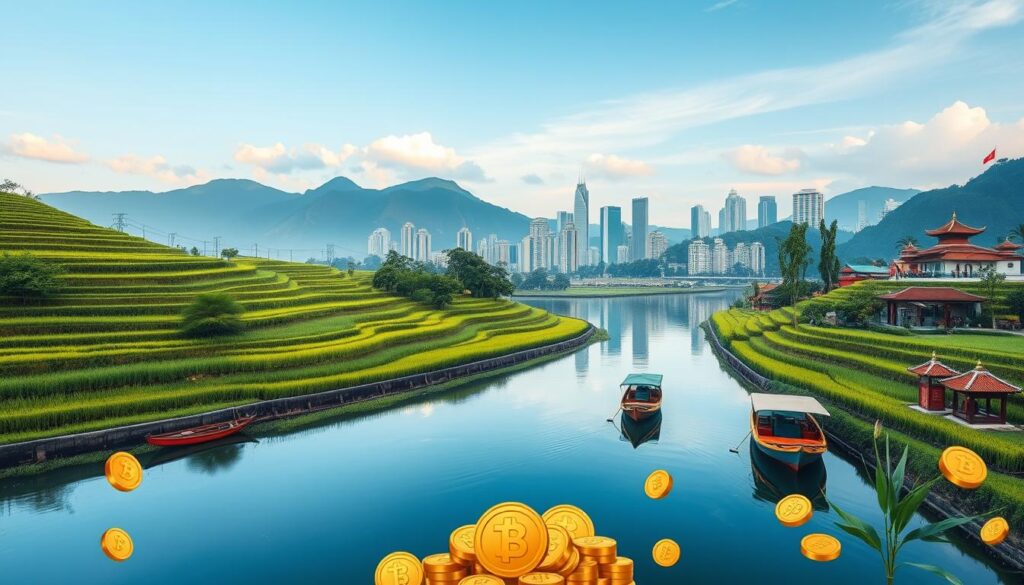
The Vietnam investor visa, commonly referred to as the DT visa, is a gateway for foreign nationals looking to reside in Vietnam while contributing to its economy. This visa type is designed for those who meet specific capital investment criteria, enabling a long-term stay in the country that can lead to permanent residency and Vietnamese citizenship. The duration of Vietnam investor visas varies significantly based on the type of visa granted: the ĐT1 visa lasts no more than 5 years, the ĐT2 visa is limited to 3 years, the ĐT3 visa also lasts up to 3 years, and the ĐT4 visa is issued for a maximum of 12 months7.
Investment thresholds play a crucial role in the visa allocation process. For instance, the ĐT1 visa necessitates a capital contribution of at least 100 billion VND, while the ĐT2 visa requires contributions between 50 billion and under 100 billion VND. The ĐT3 visa specifically caters to those who invest between 3 billion VND and under 50 billion VND, and the ĐT4 visa is designated for capital contributions of less than 3 billion VND7. These categories reflect the structured approach Vietnam takes to facilitate foreign investment, thereby promoting a robust economic environment.
To successfully apply for a Vietnam investor visa, specific documentation is necessary. Applicants must provide essential documents such as the Investment Registration Certificate, Business Registration Certificate, and certification of investment status from competent state agencies in Vietnam7. The fees for applying for a Vietnam visa vary based on the visa duration and the number of entries; costs range from 25 USD for a single-entry visa to 155 USD for multiple-entry visas valid up to 5 years7.
Investors looking for efficiency in processing their applications can turn to agencies like Nhi Gia, known for a quick turnaround time of 2-3 days under regular circumstances. In urgent cases, processing can be expedited to just 1-2 hours7.
Types of Vietnam Investor Visas
In Vietnam, investors can choose from several types of visas depending on their investment capital. The Vietnam investment visa types include the DT1 visa, DT2 visa, DT3 visa, and DT4 visa, each tailored to meet different investment thresholds and durations.
DT1 Visa
The DT1 visa is designated for foreign investors contributing at least 100 billion VND (approximately $4.3 million). This visa allows a validity period of up to 5 years and can be extended with a temporary residence card for the same duration, making it a favored option for significant investors89.
DT2 Visa
For investors with a capital investment between 50 and 100 billion VND, the DT2 visa is the ideal choice. This visa holds a validity of 5 years and promotes investment activities in Vietnam by accommodating a broad range of business interests10.
DT3 Visa
The DT3 visa is intended for investments ranging from 3 to 50 billion VND. Valid for 3 years, this visa type enables small to medium investors to establish and grow their businesses within the Vietnamese market8.
DT4 Visa
For those investing less than 3 billion VND, the DT4 visa is applicable. With a shorter validity of up to 12 months, this visa serves as an entry point for startups and smaller investments8.
| Visa Type | Minimum Investment | Validity Period |
|---|---|---|
| DT1 Visa | 100 billion VND (~ $4.3 million) | Up to 5 years |
| DT2 Visa | 50 – 100 billion VND (~ $2.1 – $4.3 million) | Up to 5 years |
| DT3 Visa | 3 – 50 billion VND (~ $127,605 – $2.1 million) | Up to 3 years |
| DT4 Visa | Under 3 billion VND (~ $127,605) | Up to 12 months |
The choice of visa depends significantly on the investor’s capability and business objectives in Vietnam, with each offering distinct advantages tailored to support varying scales of investment10.
Benefits of the Vietnam Investor Visa
The benefits of Vietnam investor visa are numerous and attractive for foreign investors. This visa allows individuals to live, work, and invest in Vietnam, promoting a seamless integration into the country’s rapidly growing economy. With investment opportunities in various sectors, including real estate and manufacturing, investors can enjoy substantial returns and an improved quality of life.
One of the significant advantages of residency by investment is the potential for long-term or permanent residency. Investors holding DT1 or DT2 visas may qualify for residence cards, enabling them to stay in the country for up to 5 years at a time, depending on their investment amount1112. The flexibility of the Vietnam Investor Visa extends beyond personal benefits, as it grants the ability to sponsor family members for entry into Vietnam. Married spouses and children under 18 can join investors, enriching the family’s experience in their new home.
Furthermore, the processing time for visa approval is generally efficient—typically around 10 working days—making it a straightforward choice for those looking to relocate11. Investors also enjoy certain financial advantages; for example, several countries, including the UK, Germany, and France, are exempted from the Vietnam visa stamp fees, which range from $50 to $155 based on the visa duration11. This framework positions Vietnam as an increasingly appealing country for foreign investments.
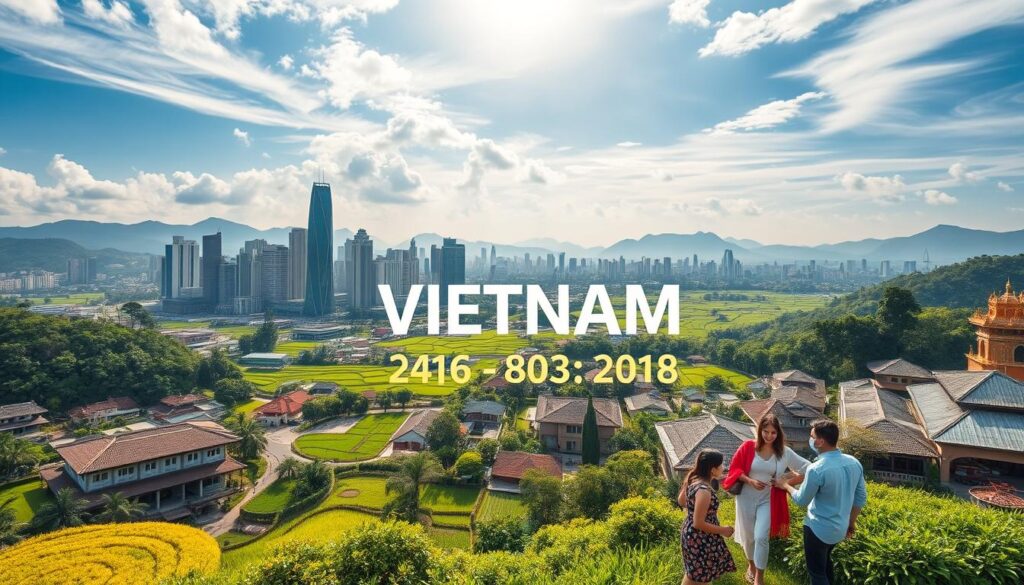
| Visa Type | Duration | Capital Contribution Requirement |
|---|---|---|
| DT1 Visa | Up to 5 years | At least VND 100 billion |
| DT2 Visa | Up to 5 years | VND 50 billion to under VND 100 billion |
| DT3 Visa | Up to 3 years | VND 3 billion to under VND 50 billion |
| DT4 Visa | Up to 1 year | Less than VND 3 billion |
In summary, the Vietnam Investor Visa presents appealing benefits that attract numerous foreign investors. As more individuals seek residency by investment, the opportunities within this bustling economy will likely lead to a surge in applications.
These advantages ensure that Vietnam remains a focal point for investment and immigration in Southeast Asia111213.
Eligibility Requirements for Vietnam Citizenship
Understanding the eligibility for Vietnam citizenship through investment is crucial for potential applicants. Various requirements outline the necessary steps to obtain residency and eventual citizenship based on specific investment criteria.
Investment Capital Requirements
The investment capital requirements play a significant role in the citizenship application process. To qualify for a 12-month residence permit, a minimum investment of 3 million VND is essential. For those seeking a more extended 5-year residence permit that leads to citizenship, the maximum investment needed is 100 million VND14. It’s important to note that Vietnam does not permit dual citizenship, which influences the decision-making process for many investors15.
Documentation Needed for Application
Gathering the proper documentation for citizenship application is vital. Key documents include proof of investment and business registration certificates. Additionally, specific forms tailored to the Vietnamese immigration system must be submitted15. Applicants should ensure all documents are complete to expedite the processing time, which can take approximately five years for those applying based on investment14.
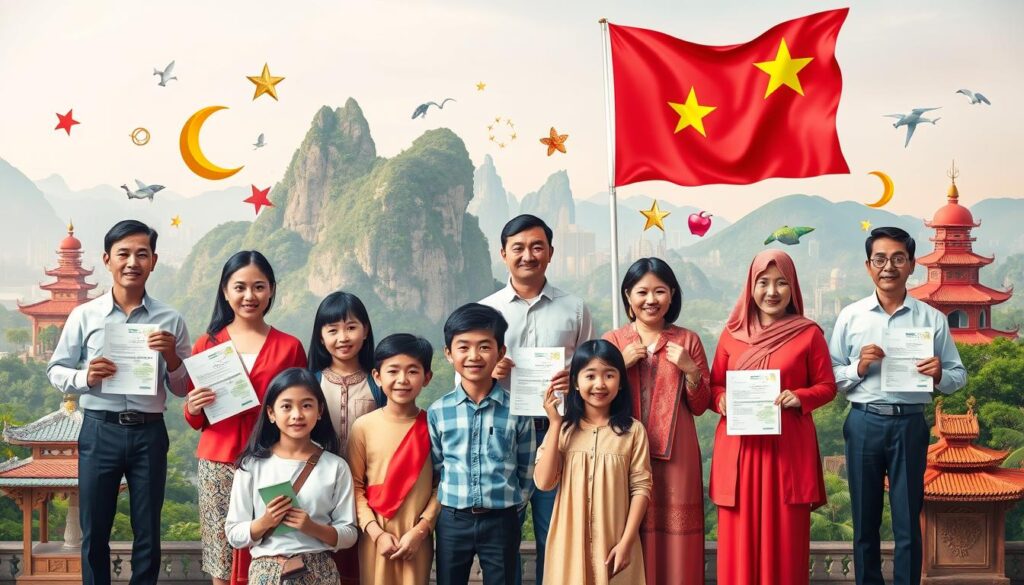
| Requirement | Details |
|---|---|
| Minimum Investment | 3 million VND for 12-month permit |
| Maximum Investment | 100 million VND for 5-year permit |
| Citizenship by Investment Timeframe | 5 years |
| Documentation Required | Proof of investment, business registration, specific immigration forms |
| Dual Citizenship | No |
Application Process for Vietnam Investor Visa
The application process for Vietnam investor visa involves several structured steps, ensuring efficient navigation through the requirements whether you are inside Vietnam or applying from abroad. Understanding these differences is crucial for a smooth application procedure.
Steps for Foreigners Inside Vietnam
Foreign nationals currently in Vietnam can follow these steps for the application process for Vietnam investor visa:
- Gather necessary documents, including the Investment Certificate and proof of capital contribution, such as bank statements. Make sure to include your business registration documents and the operating license of your company16.
- Submit your application form (NA16), including the company’s signature and seal, along with your passport copy16.
- Wait for the application to be processed, which typically takes about five working days17.
- Once approved, collect your Visa at designated locations18.
Steps for Foreigners Applying from Abroad
For individuals applying for Vietnam visa from abroad, the procedure differs slightly:
- Begin by submitting your application along with relevant documents to a Vietnamese embassy or consulate. This includes the investment requirements relevant to the type of visa you seek—DT1, DT2, DT3, or DT4, depending on your capital investment17.
- Ensure to include documentation like the application forms for foreigners and any other specific requirements based on your location16.
- Processing times at embassies are typically between five to seven working days17.
- Upon approval, prepare for your entry into Vietnam, especially if entering through border checkpoints, which may have specific conditions16.
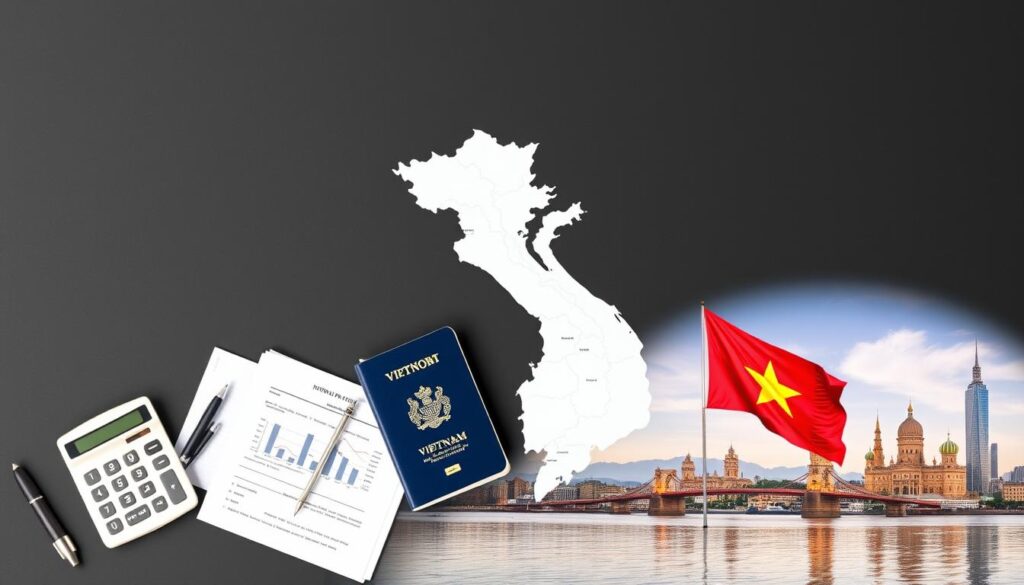
Living in Vietnam as a Permanent Resident
Living in Vietnam as a resident offers unique opportunities and enriching experiences after securing an investor visa. The Vietnam permanent residency program allows foreigners to become integral parts of the community, contributing to its vibrant culture and economy.
One of the most significant advantages of this program is the availability of a 10-year renewable permanent residence card for individuals interested in living and working in Vietnam for an extended period19. Foreigners can gain permanent residency through various eligibility cases, such as governmental awards, sponsorship by Vietnamese citizens, or as scientists and experts residing in Vietnam19. For those sponsored by family members, having a stable income and legitimate residence in Vietnam is essential19.
Integration into Vietnamese life includes embracing local customs and learning the language, enhancing communication with locals. Residents might find that community engagement—whether through social events, local markets, or cultural festivals—provides a deeper understanding of Vietnam’s heritage.
Moreover, permanent residents can access various essential services, such as healthcare and education. The education system in Vietnam offers both local and international options, catering to diverse needs. Vietnam’s healthcare facilities range from public to private institutions, ensuring adequate medical assistance for all residents.
For those considering a permanent residency application in Vietnam, it’s important to note that applicants must have resided in the country for a consecutive period of at least 3 years within the last 4 years prior to their application19. The processing time for PR applications typically takes around 4-6 months from the submission of complete documents19.
Living in Vietnam not only opens doors to business ventures but also enables an enriched lifestyle amidst a blossoming economy. It is an ideal choice for investors who seek a dynamic environment to grow their ventures while enjoying the cultural richness of this beautiful nation.
Naturalization Process to Obtain Vietnamese Citizenship
The naturalization process Vietnam entails several key steps for individuals aiming at obtaining Vietnamese citizenship. It begins with the necessity to submit comprehensive documentation, including a valid passport, birth certificate, criminal record checks, proof of residency in Vietnam, and evidence demonstrating proficiency in the Vietnamese language20. Typically, applicants must present seven specific documents to support their candidacy21.
During the application process, {a citizenship test might be required to evaluate applicants’ understanding of Vietnamese history, culture, and legal matters20. An interview will also take place to assess language skills and cultural knowledge, in addition to understanding the applicant’s motivations for pursuing citizenship20.
Generally, Vietnam does not allow dual citizenship, indicating that applicants may need to renounce their original nationality in specific situations20. A majority of naturalization candidates must have resided in Vietnam for a minimum of five years and hold a permanent residence card issued by local authorities22.
The naturalization dossier must include an application for Vietnamese nationality and supporting documents such as proof of livelihood and judicial records from both Vietnamese and foreign authorities22. It is crucial to file the application personally at the provincial-level Justice Service in the locality where the applicant resides22. The processing time for a complete dossier is typically around 120 days, but this may extend if additional information is required22.
For a successful outcome in the naturalization process, individuals are advised to seek assistance from a qualified immigration lawyer or consult directly with relevant Vietnamese government offices20. Certainly, patience and thorough preparation play essential roles in navigating the intricacies involved in obtaining Vietnamese citizenship.
Timeframes and Costs Involved
Vietnam citizenship costs can vary significantly depending on the chosen visa route. For instance, the typical investment required for a Vietnamese citizen to apply for an E-2 visa is over US $150,000, which is roughly 3.4 billion Vietnamese Dong23. The processing times associated with visa applications can also fluctuate based on the location of the applicant. If applying from within the USA, processing times can range from 2 weeks to 5 months, whereas those applying from abroad may see times from 2 weeks to 4 months23.
When it comes to expedited services, premium processing for an E-2 visa is an option available at a cost of $2,500, which guarantees processing in just 15 days23. Additional costs associated with obtaining an E-2 visa include fees like $460 for Form I-129, $370 per dependent for Form I-539 if the investor is in the USA, and $205 for the DS-160 form if applying from outside the USA23.
For an expedited Vietnam visa, applicants generally experience a processing time of 3 to 5 working days, with about 75% of applicants falling within this range24. Emergency services can expedite the processing further to just 4-8 working hours or 1-2 working days, albeit at a higher fee. The costs for an e-visa can be as low as $25 for single-entry or $50 for multiple-entry24.
It is crucial to ensure that all information is accurate when submitting an e-visa application, as the fees are non-refundable in cases of rejection24. The validity of an e-visa extends up to 90 days for both single and multiple entries, but applicants should note that extensions cannot be processed in Vietnam and may necessitate a visa run to a neighboring country24.
Reasons to Choose Vietnam for Investment
Vietnam stands out as a prime location for investors seeking substantial opportunities. With its fast-growing economy, robust market potential, and a strategic geographical position, it offers compelling Vietnam economic opportunities that attract foreign investment.
The minimum investment amount for Vietnamese citizens looking to apply for an E-2 visa is typically over US $150,000, with a requirement for at least 50% ownership in the business23. The investment landscape is supported by a friendly business environment, aided by policies from the Vietnamese government that foster growth and a welcoming approach to foreign businesses. In 2022, Vietnam ranked third for the issuance of visas through the EB-5 investor program, with 815 visas issued, reflecting a strong interest in contributing to the local economy6.
Furthermore, maintaining a Vietnamese passport opens doors to freedom of travel across ASEAN countries, eliminating the hassle of visa requirements25. Expats can more easily integrate into the vibrant local market and cultivate essential networks, further enhancing their operational capabilities. Holding a Vietnamese passport also simplifies property ownership, making it a significant advantage for those investing in real estate.
On a broader scale, with over 32 visa categories available for individuals seeking residency in Vietnam, investors can find numerous pathways to establish their presence25. The increasing population of ultra-high net worth individuals in Vietnam, which reached over 1,059 in 2022, supports the claim that this nation is an emerging hub for affluent investors6.
In essence, Vietnam’s combination of favorable investment conditions, governmental support, and vibrant communities make it an attractive landscape for anyone looking to invest in Southeast Asia. Interested investors can explore options for citizenship and the various benefits associated with local ownership by visiting relevant resources on obtaining a Vietnamese passport and navigating legal obligations here.
Conclusion
In summary, the Vietnam Citizenship By Investment program offers a unique pathway to obtaining residency and citizenship in a dynamic and growing economy. Understanding the details of the investor visa system, including various visa types and eligibility requirements, is crucial for interested individuals navigating their options. Particularly significant are the opportunities presented by the EB-5 visa program, which provides alternative avenues for investment and residence in the United States, showcasing the interconnectedness of global immigration systems.
Potential investors should take into account the benefits of settling in Vietnam, including property ownership rights and the chance to engage in a vibrant cultural landscape. For those looking to make informed decisions, it is helpful to review the various investment opportunities in the country and familiarize oneself with local regulations and procedures. A comprehensive summary of Vietnam immigration options can guide this process effectively.
Vietnam presents a compelling case for long-term investments, combining stable economic growth with a friendly business climate. Overall, those considering Vietnam Citizenship By Investment should weigh the substantial advantages and know that their choices can open doors to new opportunities and a flourishing lifestyle262728.
FAQ
What is the process to obtain Vietnam citizenship through investment?
While Vietnam does not have a designated “citizenship by investment” program, foreign investors can apply for an investor visa, leading to residency and potential citizenship through naturalization after residing for five years.
What types of investment visas are available in Vietnam?
There are four types of Vietnam Investor Visas: DT1, DT2, DT3, and DT4, categorized by investment amount and validity period. Each visa type has specific capital investment thresholds, allowing foreign nationals to live and work in Vietnam.
How can I apply for a Vietnam Investor Visa?
The application process varies for those inside Vietnam and those applying from abroad. Generally, applicants must prepare necessary documentation, including proof of investment, and submit it to the local immigration office or Vietnamese embassy.
What are the benefits of obtaining a Vietnam Investor Visa?
Key benefits include the ability to live, work, and invest in Vietnam, access to family sponsorship, long-term residency options, and the chance to secure a Vietnamese passport through investment.
What are the eligibility criteria for obtaining residency through investment?
Eligibility typically requires meeting capital investment levels set for each visa type and providing necessary documentation, such as business registration and proof of investment, during the application process.
How long does the application process take, and what are the costs involved?
Processing times can vary but typically take several months. Costs may include visa application fees, potential legal fees, and costs for preparing required documents. It’s essential to budget accordingly for this process.
Can I bring my family with me if I obtain a Vietnam Investor Visa?
Yes! The Vietnam Investor Visa allows you to sponsor family members for entry into Vietnam, enabling your spouse and children to join you as residents.
What does the naturalization process involve once I have residency?
The naturalization process requires maintaining residency for at least five years and fulfilling specific criteria, including language competency and lawful activities during your residency. A formal application can then be submitted for citizenship.
What is the appeal of living in Vietnam as a permanent resident?
Living in Vietnam offers a unique blend of culture, growth opportunities, and an affordable lifestyle. Residents enjoy rich cultural experiences, healthcare access, and a vibrant community, making Vietnam an appealing choice for expatriates.
Are there specific conditions to maintain my investor visa?
Yes, visa holders must comply with Vietnamese laws and regulations, ensure their investment remains active, and regularly renew their visas as necessary to maintain residency status.
Source Links
- https://lawyers-vietnam.com/vietnam-citizenship-by-investment/
- https://www.myvietnamvisa.com/vietnam-investor-visa.html
- https://www.goldenvisas.com/vietnam
- https://globalreferral.group/unlocking-vietnamese-citizenship-a-comprehensive-guide-to-requirements-and-eligibility/
- https://luatminhnguyen.com/en/trade-inter/permanent-residency-or-citizenship-in-vietnam/
- https://www.eb5investors.com/eb5-countries/eb5-visa-vietnam/
- https://nhigia.vn/en/service-manuals/what-is-an-investor-visa-investor-visas-dt1-dt2-dt3-and-dt4-visas
- https://www.myvietnamvisa.com/vietnam-visa-types.html
- https://nhigia.vn/en/news/dt1-visa-vietnam-investor-visa-for-foreigners
- https://www.vietnam-visa.com/vietnam-visa-types/
- https://novalaw.vn/en/vietnam-investor-visa/
- https://delco-construction.com/en/visa-application-procedures-for-foreign-investors-in-vietnam/
- https://www.usimmigrationadvisor.com/vietnam.html
- https://lawyers-vietnam.com/citizenship-in-vietnam/
- https://nhigia.vn/en/service-manuals/the-newest-dual-citizenship-procedure-for-overseas-vietnamese
- https://phamconsult.com/procedures-for-applying-for-an-investment-visa-for-foreign-investors-in-vietnam/
- https://ownpropertyabroad.com/vietnam/vietnam-investor-visa/
- https://www.visa5s.com/news/newest-policy-of-investor-visa-vietnam-2024-validity-and-requirements.html
- https://www.mondaq.com/general-immigration/1286000/how-to-get-your-permanent-residence-in-vietnam
- https://globalreferral.group/from-foreigner-to-citizen-mastering-the-naturalization-process-in-vietnam/
- https://vnembassy-beijing.mofa.gov.vn/en-us/Consular Services/Consular Procedure/Pages/41.-Xin-trở-lại-quốc-tịch-Việt-Nam-tại-Cơ-quan-đại-diện-Việt-Nam-ở-nước-ngoài.aspx
- https://hankuklawfirm.com/en/procedures-for-naturalization-in-vietnam-for-foreigners/
- https://www.eb5brics.com/vietnam/e-2-visa-vietnam
- https://www.vietnam-visa.com/vietnam-e-visa/
- https://www.duongbusinessconsulting.com/immigrationlaw/reasons-get-vietnamese-passport/
- https://www.usimmigrationadvisor.com/immigration-blog/eb5-visa-for-vietnamese-investor-2023-2024-direct-versus-regional-center-whats-the-better-option/
- https://luatminhnguyen.com/en/trade-inter/unlocking-vietnamese-citizenship-essential-requirements-and-eligibility/
- https://globalreferral.group/dual-citizenship-in-vietnam-possibilities-limitations-and-legal-considerations/

Comments